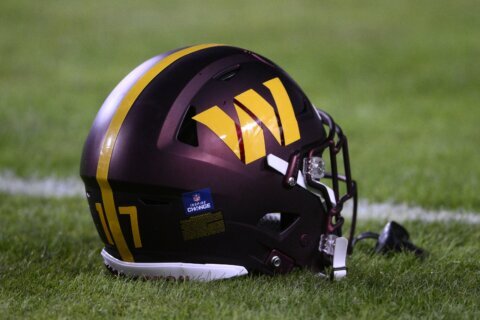“Never” finally arrived on July 13, 2020. That’s when the three-time Super Bowl Washington football champions officially dropped Redskins as their name.
It is a stunning development for a franchise that fought so long to keep its moniker and then jettisoned Redskins into retirement before being ready to announce a new name. And my surprise is not just because team owner Dan Snyder used the word “never” when asked about changing the Redskins name in a 2013 USA Today interview, but because of my personal experience over the last three decades.
Back in 1991, then-WTOP Vice President and General Manager Michael Douglass stated clearly he felt “Redskins” was an offensive term and he no longer wanted it used on the air when referring to the most popular sports team in town. I was anchoring sports in the afternoon at the time and for months used “’Skins” and Burgundy and Gold” as substitutes for Redskins.
There was no social media then and there was no groundswell of support from other media organizations or fans to stop calling the team the Redskins and change the name. By the summer of 1991, as the Redskins prepared to go to training camp, I remember a newsroom conversation when we decided to go back to using Redskins on air — not to make a judgment, but because that was still the team’s name.
There really wasn’t a controversy. WTOP was at the time the region’s only station to stop referring to the team as Redskins, and by the fall of 1991, the focus had fully shifted to what they were doing on the field. The Redskins did plenty on the field and by the end of January 1992 they were Super Bowl champions with another victory parade on the way.
In March 1992, Douglass reasserted his policy that the now reigning Super Bowl champions should not be referred to as “Redskins” because he still very much considered it a racial slur. Douglass’ banishment of the word “Redskins” from WTOP didn’t last and only stirred more debate about whether the word was offensive and who was offended by it.
It is remarkable then that this NFL team is working through trademark issues to rename itself. Decades of court cases and protests against Redskins as the team’s name did not force a name change, but this summer did. Against a backdrop of heightened awareness of social justice and mounting financial pressure from sponsors, suddenly Dan Snyder was swayed to reverse course on his defiance and change the name.
We should not have had to wait until 2020 for this. There was a window of opportunity in 1991, but only a crack and even then it did not widen.
In 2013, I wrote that a Redskins name change would come down to money. In college sports, offensive nicknames have been dropped before. Syracuse is no longer the Orangemen, but just the Orange. St. John’s is no longer the Redmen, but the Red Storm. North Dakota is no longer the Fighting Sioux.
The NCAA threatened postseason bans for schools that did not eliminate offensive nicknames. The NFL could have done something similar. The league always had the big bargaining chip in the form of its lucrative television contract and the shares it doles out to member teams.
The NFL could have said to Snyder, “no name change, no television money.” That would have been game over for the Redskins. Ticket sales and concession money are nice, but NFL teams survive on broadcast cash.
The NFL allowed the Redskins name to live on. The league could have forced a name change years ago, and certainly just a few weeks ago as the entire nation started on a journey of self-evaluation.
Instead we have reached this point because enough people collectively said enough, and demanded that the time was now to lose Redskins as an acceptable team name. For change to happen those voices had to make sure blue chip team sponsors, such as FedEx, Nike and Pepsi, heard their outcry.
The message was received. Our NFL team has a new name and it truly is a new day. Unlike in 1991, there is a willingness to listen this time around, with a desire to do better.








